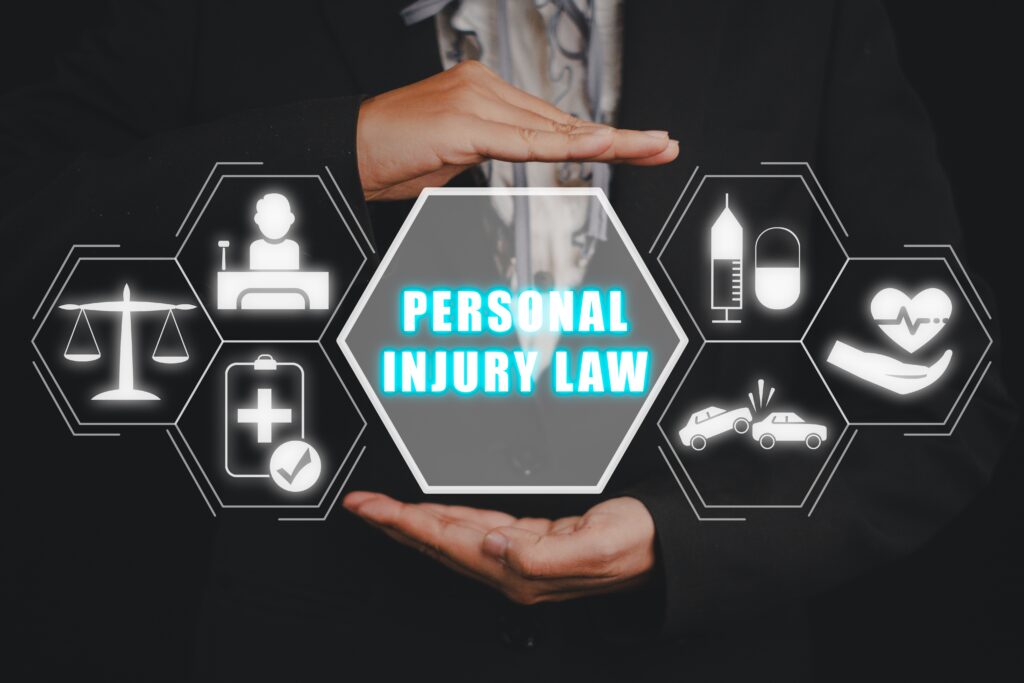Experiencing a personal injury because of someone else's negligence can be a difficult and daunting ordeal. In these challenging circumstances, seeking legal representation from a skilled personal injury attorney is imperative for pursuing fair compensation.

However, finding the right attorney is critical, and asking pertinent questions during the initial consultation is vital in making an informed decision. Before hiring a personal injury attorney in Sebastian, you must inquire about several key aspects to ensure they possess the necessary experience and dedication to handle your claim effectively.
Schedule A Consultation Today!
Understanding Personal Injuries
A personal injury is any physical or psychological damage or harm inflicted on an individual's body, mind, or emotions, as opposed to claims arising from property damage. These injuries often stem from accidents or incidents in which another person's negligence, recklessness, or intentional actions caused harm to the affected person. Examples of personal injuries include but aren't limited to the following:
- Motor Vehicle Accidents: Injuries resulting from car accidents, motorcycle accidents, truck accidents, or other collisions on the road.
- Slip and Fall Injuries: Injuries from slipping, tripping, or falling due to hazardous conditions on another person's property, such as uneven surfaces or wet floors.
- Workplace Injuries: Harm suffered while on the job, including falls, equipment malfunctions, exposure to hazardous substances, or repetitive stress injuries.
- Medical Malpractice Injuries: Injuries caused by medical professionals' negligence, including surgical errors, misdiagnoses, medication errors, or birth injuries.
- Product Liability Injuries: Harm caused by defective or dangerous products, such as malfunctioning machinery, contaminated food, or unsafe consumer goods.
- Assault and Battery Injuries: Injuries resulting from intentional harmful actions, including physical attacks, assaults, or incidents of battery.
- Dog Bite Injuries: Injuries inflicted by a dog, often due to the owner's negligence or failure to control the animal.
- Premises Liability Injuries: Injuries that occur on someone else's property due to unsafe conditions, inadequate security, or negligence on the part of the property owner.
- Construction Site Injuries: Injuries suffered on construction sites due to accidents, falls, equipment failures, or unsafe working conditions.
- Wrongful Death: Fatal injuries resulting from the negligence or intentional actions of another party, leading to the death of an individual.
These examples highlight the diverse nature of personal injuries, showing that they can occur in various settings and result from various circumstances. In each case, seeking legal advice is crucial to understanding one's rights and pursuing fair compensation for damages.
Why You Need a Personal Injury Lawyer on Your Side
Facing a personal injury, whether from a car accident, slip and fall, or medical malpractice, involves navigating complex legal procedures and dealing with insurance companies. Seeking the assistance of a personal injury lawyer becomes paramount during this challenging time for several practical reasons.
Knowledge of Personal Injury Law
A personal injury attorney possesses specialized knowledge of the complex statutes, regulations, and legal precedents in personal injury law. Their professional experience allows them to analyze your case's unique aspects and develop a strategy to enhance your chances of a successful claim.
Understanding Legal Deadlines
Personal injury claims have strict deadlines, known as statutes of limitations. A personal injury attorney ensures timely completion of all necessary paperwork and filings to prevent the loss of your right to seek compensation.

Handling Insurance Company Tactics
Insurance companies often use tactics to undermine claims, especially with claimants who don't have legal representation. A personal injury lawyer knows how to manage their tactics, protecting your interests and advising against direct communication with insurance adjusters. In many cases, hiring a lawyer substantially reduces the insurance company's use of these unfair tactics.
Calculating Full Damages
Beyond medical bills and lost income, a personal injury attorney considers factors such as pain and suffering, emotional distress, loss of consortium, and future medical costs when valuing and negotiating your case. Their goal is to obtain full and fair compensation for your injuries and damages.
Handling Complex Legal Procedures
Personal injury cases involve various legal procedures, from evidence gathering to negotiation and possibly trial. An experienced attorney efficiently navigates these procedures, allowing you to focus on healing and recovery.
Objectivity and Emotional Support
Personal injuries can be emotionally challenging, leading to impulsive decisions. A personal injury lawyer offers an unbiased perspective and emotional support throughout the process, helping you manage stress and expectations.
Accurate Assessment of Your Claim
A seasoned personal injury attorney thoroughly evaluates your case, assessing its strengths and weaknesses during the initial consultation. This assessment guides decisions on pursuing a claim. During negotiations, they will downplay your case's weaknesses and highlight its strengths.
Investigation and Evidence Gathering
Successful personal injury claims require a comprehensive investigation and solid evidence. A personal injury attorney has access to experts, investigators, and resources to gather crucial evidence, strengthening your case.
Focus on Your Recovery
Hiring a personal injury lawyer lets you focus on your recovery and well-being. Dealing with the legal complexities becomes their responsibility, providing you with peace of mind during the healing process.
A personal injury lawyer isn't just a legal representative and a dedicated advocate committed to protecting your rights and best interests. Their experience in personal injury law, negotiation skills with insurance carriers, and ability to build a strong case give you the best chance of securing fair compensation for your injuries. Seeking assistance from a qualified personal injury attorney is a wise decision to ensure the insurance company treats you fairly and that you obtain the compensation the law entitles you to.
Questions to Ask Your Potential Personal Injury Attorney
Are You Board-Certified in Personal Injury Law?
Board certification requires extensive courtroom experience and a passing grade on the state bar examination. It signifies high proficiency in personal injury trial law. While hiring a lawyer without certification is okay, having one can boost your confidence and increase your claim's chance of success.
How Many Personal Injury Clients Have You Represented?
Hiring an attorney with substantial experience in personal injury law is in your best interest. An experienced lawyer can apply their specific skills and knowledge gained from handling numerous cases to your case to get you fair compensation.
Can You Provide References from Past Clients in Personal Injury Cases?
Feedback from former clients provides valuable insights into the lawyer's professionalism and commitment. Request references and follow up to learn about their experiences. You can also read reviews on Google or their website to understand what working with them is like.
Have You Represented Claims Similar to Mine, and What Were Their Outcomes?
While each case is unique, knowing if the lawyer has successfully handled similar circumstances is important. Understanding the outcomes of these cases helps gauge the lawyer's ability to secure favorable results.
What is Your Initial Assessment of My Claim, and What are its Strengths and Weaknesses?
A competent personal injury lawyer will assess your case during the initial consultation. Request an honest evaluation of the strengths and weaknesses to understand its viability and potential challenges.
Do You Have the Time to Work on My Case Now?
Attorneys with heavy caseloads may be unable to start working on your case promptly. Timely attention is crucial to prevent the loss or destruction of valuable evidence. It's also important based on your state's statute of limitations for personal injury claims.
Will You Answer My Phone Calls, and Who Will be My Designated Contact at the Firm?
It is invaluable to have a consistent contact person, whether it's the attorney, paralegal, or assistant, who promptly responds to or returns your calls when you have questions. Find out the best way to communicate with your attorney when you have questions or concerns.
Will You Notify Me of Settlement Offers?
Ensure the lawyer commits to informing you promptly about any settlement offers from the insurance company. It's your right to be aware of offers and make decisions regarding settlements. It's unethical for an attorney to make such decisions on your behalf.

Are You Willing to Take My Case to Trial?
Inquire about the lawyer's approach, legal strategies, and willingness to go to trial if necessary. A lawyer experienced in both negotiation and litigation is better equipped to protect your interests. While negotiating a settlement is always preferable, it's not always possible. Some cases must go to trial to garner full and fair compensation. If your case is one of them, you want a lawyer who is willing and prepared to go to court.
How Many of Your Cases Go to Trial?
While most personal injury claims settle and don't go to trial, understanding the lawyer's trial experience is vital. A lawyer willing to go to court if the insurance company does not offer a fair settlement demonstrates a commitment to their client's interests.
What Happens if I Don't Win? Am I Responsible for Any Case-Related Expenses?
This question holds significant importance as its answer can directly affect your financial well-being. There are certain litigation costs in every legal case, especially those that go to court. The longer your case continues, the more these costs may accumulate. When you're speaking with a personal injury attorney, ask how they handle these expenses.
Regardless of the case outcome, there are costs associated with filing fees, medical record retrieval fees, and other essential administrative tasks necessary for the progression of your case. Some attorneys may bill you for these costs, regardless of whether you win or lose, while others may not.
What Value Can I Expect for My Personal Injury Case?
Determining the precise value of any client's case is a challenging task, even from the perspective of a trial attorney. The uniqueness of each case means there's no one-size-fits-all solution or an accurate settlement fee calculator to rely on. As your attorney learns more about the specifics of your case, they should, however, provide you with a general idea of the potential range for your compensation.
Your attorney's proficiency in both courtroom trials and negotiations with insurance companies can significantly impact your case's value. If your attorney is prepared to take your case to court, it signals their commitment to fighting for maximum compensation in your settlement offer. Conversely, suppose your attorney has a history of settling without going to court. They'll likely follow the same approach in your case, potentially settling at a lower amount.
Remember, past behavior is a reliable indicator of future actions. Ensure your lawyer is ready and capable of representing you in court if needed.
How Long Will My Case Take?
While no one can predict an exact timeline, experienced lawyers often have a sense of how long cases like yours might take to settle or go to trial. Factors influencing the timeline include case complexity, extent of injuries, and party cooperation.
How Do You Manage Communication with the Insurance Company?
Your personal injury attorney will handle all communication with the insurance company on your behalf, ensuring that the insurance company treats you fairly during negotiations.
Can I Expect the Insurance Company to Settle My Case?
Insurance companies often make initial low-ball offers, aiming for a quick settlement before thoroughly assessing all damages. It's crucial to avoid falling into this trap. While experienced personal injury attorneys can't provide a definite answer, they can offer insights into the negotiation process. Speaking with a personal injury attorney is always in your best interest before accepting a settlement offer or even agreeing to talk to the insurance company.
What Legal Strategies Will You Use to Achieve a Successful Verdict in My Case?
To gain further insight into a lawyer or law firm's approach, inquire about potential strategies that can be successful in your case. Ask how they intend to address any potential challenges. Reputable attorneys won't offer one-size-fits-all answers.

What is Your Fee Structure, and How Do You Handle Expenses Related to My Case?
Understand the lawyer's fee structure, which is typically on a contingency basis. Clarify any upfront costs or expenses you may be responsible for during the legal process before hiring any personal injury attorney.
If you recently suffered a personal injury, don't waste any more time reaching out to a reputable personal injury attorney. Schedule a consultation with one today to get your claim started.
